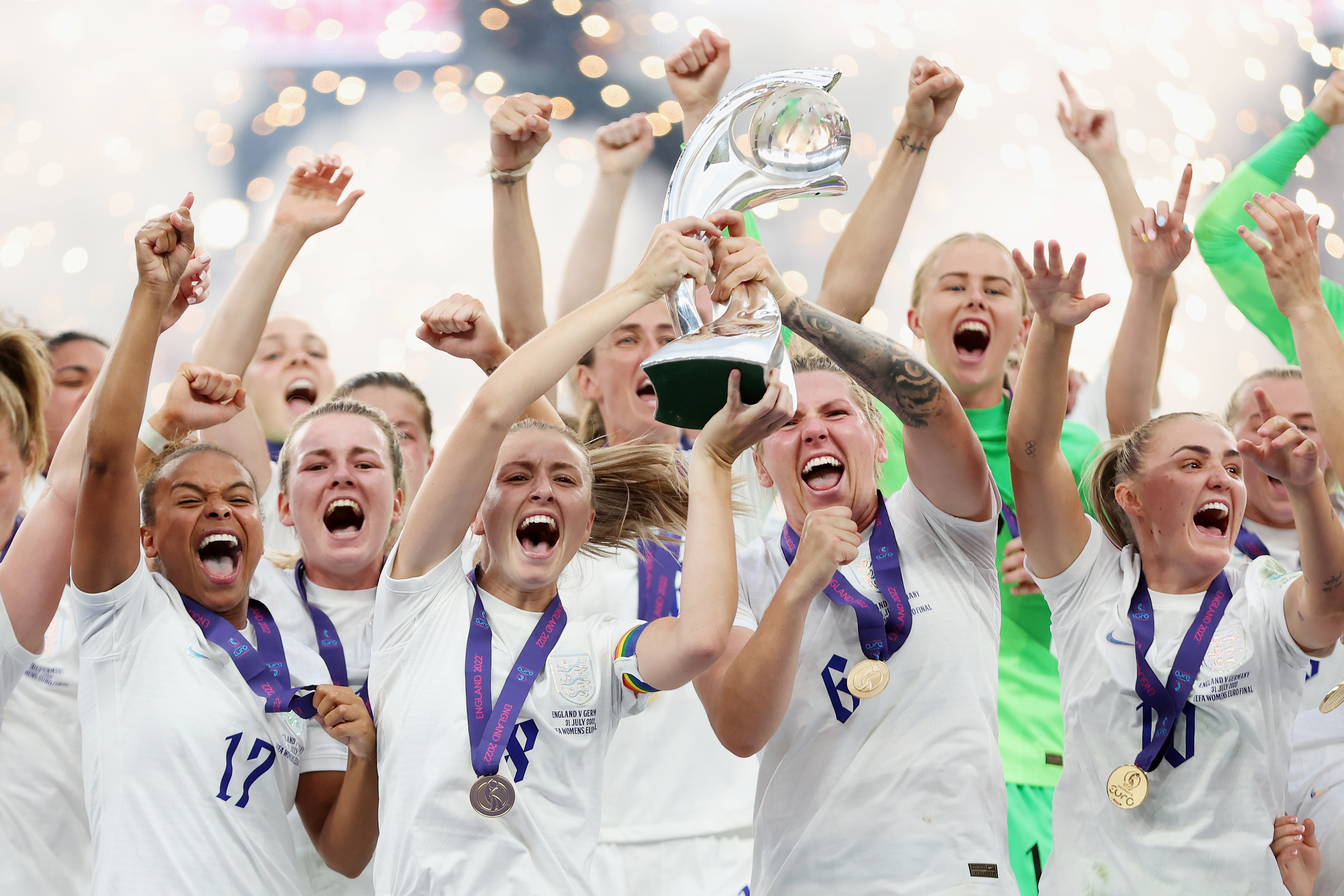
Last week, Chloe Kelly scored what would become the winning goal for England’s Lionesses in the UEFA European Women’s Championship. The Lioness celebrated by whirling her shirt above her head like a flag and racing across the field as fellow teammates flanked her. It’s an image that traversed the world. Some, like soccer pundit Gary Lineker, made inappropriate comments about Kelly’s undergarment. Most saw Kelly’s yellow-card-earning moment as an expression of “pure joy” and inspiration.
What’s in an image? Ask the Lionesses
“I had no idea how big just taking my shirt off would become — and what it would do for women,” Kelly told the United Kingdom’s Daily Mail. Although images of women’s soccer inundated the media last week, the fact remains that female athletes only comprise 3 percent of the visuals used by media. And men are three times more likely than women to be shown playing a team sport by brands and advertisers. These findings were presented by Getty Images and the Women’s Sports Foundation as the United States’ Title IX turned 50 years old this year.
Getty Images also reported a public hunger for gender inclusivity in sports: 56 percent of survey respondents said they want sports organizations to focus on inclusion, and 66 percent responded that female athletes are as capable as men but don’t receive the same amount of funding, training and coaching. The win by the Lionesses demonstrated how heeding this call to support women’s sports can pay off. The women’s final boasted a stadium of more than 87,000 fans, which ESPN reports is a record for both men’s and women’s European championships.

Nike has been investing in English women’s soccer for nearly a decade, the Financial Times (FT) reports. (It's no accident that Kelly’s now-famous sports bra features a Nike Swoosh.) The company sponsors 12 of 13 Lioness players and invests in three U.K.-rooted women’s soccer organizations. While companies like Adidas have had a foothold in men’s soccer — Adidas has provided every World Cup match ball since 1970 — Nike has had to think creatively to make a splash in the sport. Focusing on women has helped the company grow in innovative ways.
Nike’s director of women’s research, Bridget Munro, told the FT that the company has doubled its investment in new women’s products over the past two years. And here’s where it starts to pays off: Since the start of the championship, women’s soccer gear has seen a tripling of sales.
Why was this year’s Women’s Euro historic?
For one, ESPN notes the caliber of the playing seen at this tournament. Ian Darke writes that he saw a marked improvement in women’s soccer. “That [Alessia] Russo goal underlined the rapid improvement in the standards of women's football, as did Keira Walsh's brilliant pass and Ella Toone's delightful lob to open the scoring in the final. And don't forget Lina Magull's superbly taken equalizer for Germany, opening her left foot out to deftly place the ball into the roof of the England net. Wonderful technique.”
Oh, and it might be worth mentioning that English women were excluded from Football Association (FA)-affiliated grounds for about half a century, starting in 1921. This happened a year after a women’s game attracted 53,000 fans, with over 10,000 more denied entry. No soccer game in the country would surpass that level of attendance until London’s 2012 Olympics. As you might imagine, lacking access to large stadiums diminished interest in women’s soccer. It wasn’t until 2018 that the English Women’s Super League, the counterpart to the men’s Premier League, went fully professional.
Sarina Wiegman, manager of the Lionesses, is known to keep her cards close to the vest, responding at times with a simple “no” at press conferences, Darke writes. But after her team’s European championship win last week, Wiegman didn’t hold back. “I think this tournament has done so much for the game, but also for society and women in society in England, but I also think across Europe and across the world,” she said.
Image credits: Julian Finney - The FA/The FA via Getty Images; Catherine Ivill - UEFA/UEFA via Getty Images

Roya Sabri is a writer and graphic designer based in Illinois. She writes about the circular economy, advancements in CSR, the environment and equity. As a freelancer, she has worked on communications for nonprofits and multinational organizations. Find her on LinkedIn.














